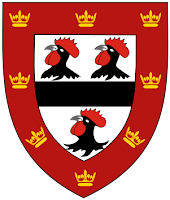Hey! I'm actually still here. Scary, right? So I've been spending some time thinking about blogging of late and I really need to get some more of that done, really. So hopefully more of this coming soon. But for now, something quick that I wanted to drop off from facebook for you all, because I'm feeling creative and pretty pleased with myself for this one.
So today, as with most days, one of those images that circulates flew through my newsfeed. It's this one, actually:
So apparently (
according to wikipedia) this poem was originally written by Mrs Rose Milligan of Lancashire back around 1998 and it bounces around the Internet and such as one of those things that's meant to inspire (and give you an excuse to do less work). In particular it extolls the virtues of getting out into the world and not burying yourself in work, something I am commonly accused of.
Anyway, having duly posted this to my profile, I was then challenged by a
very good friend and colleague of mine to science/Cambridge-ify this poem. Having a bit of spare time on my hands, that's what I decided to do and here's where I ended up (my apologies to those who aren't familiar with science/Cambridge, there's some explanations of terms below and I hope you can appreciate this anyway):
Blot if you must, but wouldn’t it be fun
To punt the Cam and enjoy the sun,
Bake a cake or take a ride,
Leave the lab and enjoy the world outside.
PCR if you must, but there’s not much time
With dinners to eat and college chapels to climb,
Choirs to hear and films to see,
Friends to cherish and people to be.
Sequence if you must, but real life’s out there,
With the wind in your face and the rain in your hair,
Cycle home on the backs to a big mug of tea.
This day’s had more than enough science for me.
Code if you must, but bear in mind,
Tenure may come, it still won’t be kind.
And when you go – and go you must –
All of your papers, will gather more dust.
So, I replaced dusting with various common techniques relating to my PhD. Blotting is a technique that allows the identification of different molecules in a biological sample, especially proteins and DNA. PCR is commonly used in biology and phorensics to make copies of DNA and can be useful for identifying specific genes which can be used to tell where the DNA came from and what it does. Sequencing is how you know what sequence of the letters A, C, G and T make up a specific piece of DNA and coding is what you call it when you write a computer program.
Menawhile, tea is quintessentially British and I really wanted to put it in there. Cycling, choirs, dinners, wind and punting are all things people commonly link with Cambridge, although I personally don't cycle here. And I had to leave the original line about baking cake in there because everyone expects me to make cake.
Here's one of my recent attempts (that's my college colours and the cockerel from the college crest):
Oh, and also some ninjabread men (that's gingerbread men doing martial arts):
TTFN *boing*







